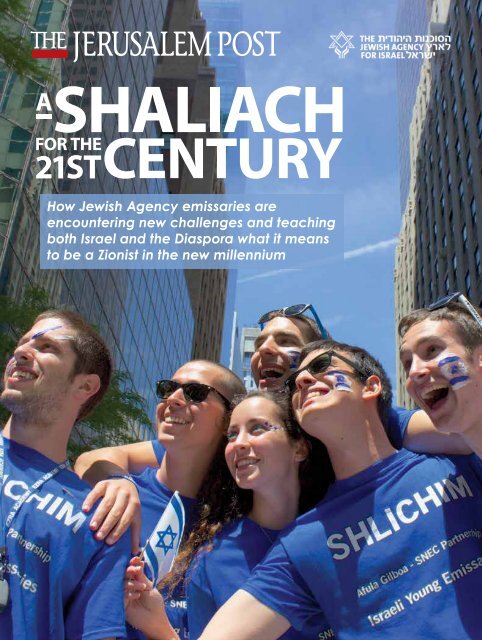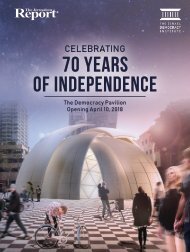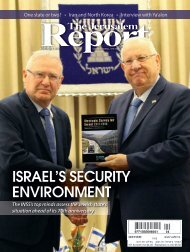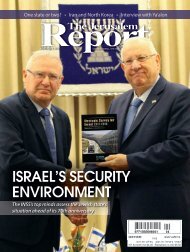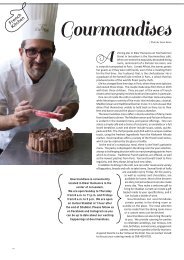היהודית
Create successful ePaper yourself
Turn your PDF publications into a flip-book with our unique Google optimized e-Paper software.
THE JERUSALEM POST<br />
How Jewish Agency emissaries are<br />
encountering new challenges and teaching<br />
both Israel and the Diaspora what it means<br />
to be a Zionist in the new millennium
JEWISH AGENCY Shlichim take<br />
to the streets at New York City's<br />
Israel Day Parade. (Raphael Rice)<br />
Table of contents<br />
The necessary emissary<br />
An interview with Natan Sharansky 3<br />
A 'shaliach' for life<br />
An interview with Alan Hoffmann 4<br />
Jewish Agency Shlichim in numbers 6<br />
Campus communicators come through 8<br />
French connection: We'll always have Zion 12<br />
South Africa: Agents of change 14<br />
Brazilian breeze 18<br />
Australia: Recovering a lost identity 20<br />
United Kingdom: Mind the gap year! 22<br />
Ukraine mantains top ranking with aliya 26<br />
Midsummer Camp’s Dream 28<br />
A shaliach's work worldwide 30<br />
IN PARTNERSHIP WITH THE JEWISH AGENCY<br />
Supplement editor: Noa Amouyal<br />
Strategic Marketing Manager: Reut Levy Laursen<br />
Copy editor: Yakir Feldman<br />
Graphic designers: Noam Elisha, Vanina Aelion<br />
and Daniela Gleiser<br />
Cover and back page image: Raphael Rice
The necessary<br />
emissary<br />
Although they share a common identity,<br />
there is much misunderstanding between<br />
Israel and the Diaspora.<br />
Jewish Agency chairman Natan<br />
Sharansky explains why it is crucial<br />
to have shlichim as interlocutors<br />
representing both sides<br />
(Marc Israel Sellem/The Jerusalem Post)<br />
• By NOA AMOUYAL<br />
Since the creation of the State of<br />
Israel, world Jewry has become<br />
more fragmented, nuanced and<br />
complex, making the role of an<br />
Israeli shaliach (emissary) coming to<br />
the Diaspora a complex and multi-faceted<br />
one.<br />
Today’s shaliach must be able to do<br />
two very important tasks: to explain the<br />
dream of Zionism to the Diaspora and<br />
to help Israelis understand why Diaspora<br />
Jews believe that there are many ways<br />
to be Jewish.<br />
It is no easy feat, but under Natan<br />
Sharansky’s leadership at The Jewish<br />
Agency, the shlichut program has been<br />
revamped to cater to this specific need.<br />
“It became clear to me that there is no<br />
better way to strengthen Jewish identities<br />
of Israelis than by encountering<br />
world Jewry,” Sharansky said.<br />
Sharansky sat down with The Jerusalem<br />
Post and explained the reason why a<br />
shaliach is necessary in our modern era.<br />
This magazine, which focuses on key regions<br />
around the world, demonstrates<br />
how Sharansky’s dream of a shaliach<br />
has become a reality.<br />
“There is more than one way to work<br />
with the Jewish community in the Diaspora:<br />
you can work through federations,<br />
a youth movement, as a summer<br />
camp counselor, on college campuses<br />
or synagogues,” he said.<br />
As such, this magazine will give readers<br />
insight into how shlichim fulfill all<br />
those different roles.<br />
Worldwide, these shlichim are embraced<br />
by their communities, as they<br />
are not only teachers of Israel but also<br />
representatives of the Diaspora.<br />
“They want Israelis to bring more of<br />
Israel into their lives,” Sharanksy said.<br />
It is a shaliach’s presence on college<br />
campuses, though, that is most critical<br />
in Sharansky’s view.<br />
“It was my idea that the main battlefield<br />
for young Jews is in the campuses,”<br />
he shares.<br />
“It is there that they are tested for the<br />
first time. They are torn between their<br />
family on one hand and their peers on<br />
the other. They’re told you can’t be a<br />
proud member of the liberal world and<br />
also be proud of your Jewish family.<br />
That tension lends itself to confrontation.”<br />
On a larger scale, though, a shaliach’s<br />
significance can potentially be to wield<br />
influence in the strained relationship<br />
between Israel in the Diaspora.<br />
The latest two controversies – egalitarian<br />
prayer at the Western Wall and<br />
the conversion bill – have placed the<br />
two entities at odds. The one influencer<br />
who has a foot in both worlds is a shaliach,<br />
the one able to cut through the<br />
deeply entrenched arrogance and condescension<br />
on both sides, Sharanksy<br />
believes.<br />
“The latest crisis reminds us yet again<br />
that there is arrogance and condescension<br />
regarding basic things. For example,<br />
Jews in the Diaspora say, ‘Why can’t<br />
you be a democracy like us?’” he explains.<br />
“Israelis then will say, ‘Why do<br />
you need all this pluralism? There is religious<br />
and secular, and that’s simple.”’<br />
“Both sides have a lot to contribute<br />
to their mutual identity,” he said diplomatically.<br />
Sharansky knows of what he speaks.<br />
Drawing from his experience as a refusenik<br />
in the Soviet Union, the Jewish<br />
Agency chairman has spent most of his<br />
career advocating for both Diaspora<br />
Jews and Israelis, and he hopes every<br />
shaliach feels the obligation to do the<br />
same.<br />
“Personally, all my life I have still felt<br />
connected to my Diaspora identity. I’m<br />
a voice for Diaspora Jewry. I want them<br />
to feel like this,” he said.<br />
“Shlichim come to represent Israeli<br />
society, but when they go back, they are<br />
unique ambassadors for Diaspora Jewry,”<br />
he said. “Things that are difficult<br />
for me to articulate to our own government<br />
ministers are easily understood by<br />
our shlichim because they’ve seen the<br />
Diaspora with their own eyes.”<br />
“A successful shaliach is one who is<br />
able to integrate the message of Zionism<br />
with his or her own individual experience<br />
of what it means to be Jewish<br />
and Israeli,” he said.<br />
In this magazine, you will see examples<br />
of young men and women who<br />
have done just that.<br />
•<br />
NOVEMBER 2017<br />
3
(Yoav Keren)<br />
A ‘shaliach’ for life<br />
The new generation is now younger, ambitious,<br />
and looking for innovative ways to engage with the Jewish world<br />
• By NOA AMOUYAL<br />
A<br />
Jewish Agency emissary used to fit a certain cookie-cutter<br />
mold, Jewish Agency director-general Alan Hoffmann<br />
tells The Jerusalem Post. Typically, they were established,<br />
middle-aged educators who came from a remote<br />
kibbutz, culled from a relatively small pool of candidates.<br />
In the past decade, under Hoffmann and Jewish Agency<br />
chairman Natan Sharansky’s leadership, the notion of what<br />
a shaliach is has changed dramatically. Today, they are typically<br />
in their late 20s, unattached, hail from all over the<br />
country and a variety of backgrounds and are eager to learn<br />
about the Jewish world and want the Jewish world to learn<br />
from them about Israel.<br />
“These are very talented people,” Hoffmann says of the 2,000<br />
young Israelis who dedicate a summer, a year or more to serving<br />
the Jewish people through the Jewish Agency.<br />
“One of the things we have come to know is that as much as<br />
these fantastic young people are bringing Israel to the young<br />
people they meet, they are also undergoing a learning experience<br />
when it comes to the Diaspora Jewish community.<br />
Suddenly, they understand what it’s like to be a minority,” he<br />
explains.<br />
It is that understanding, acquired by going from a majority-Jewish<br />
country to live in one where Jews can be few and far<br />
between, that impels many emissaries to continue their engagement<br />
with the Jewish world when they return to Israel.<br />
Hoffmann encourages people to think of the shlichut experience<br />
as a cyclical one where the experience never quite ends. For<br />
example, through the myriad of shlichim programs the Jewish<br />
Agency offers, in one lifetime a person can become an emissary<br />
before the army, then again after the army by enrolling as agency<br />
emissary to one of the many summer camps across North<br />
America, then can serve on college campuses when they reach<br />
4
university age and, finally, can continue<br />
to serve the Jewish World when they<br />
come back to Israel.<br />
The returning shlichim experience<br />
is a diverse one and there is no one<br />
way to continue a person’s commitment<br />
to connecting with<br />
the Diaspora.<br />
Ella Bokobza, for example,<br />
was an emissary in St. Louis,<br />
Missouri, and has just graduated<br />
from the Mandel Social Leadership<br />
MBA Program at Ben-Gurion<br />
University of the Negev in<br />
Beersheba. This is not to be confused<br />
with the Mandel Program for Leadership<br />
Excellence at the Jewish Agency,<br />
which focuses on the “selection, training,<br />
placement and advanced training<br />
of young shlichim serving throughout<br />
the Jewish world.”<br />
For Bokobza, who grew up in Beersheba,<br />
this translates into working for Tzipor<br />
Midbar (“Desert Bird”). The program offers<br />
a support mechanism for discharged<br />
lone soldiers (in Israel without close family<br />
that can help them), to make them<br />
feel like home despite the loneliness and<br />
bureaucracy that often bogs down their<br />
experiences in Israel.<br />
“While I was an emissary I understood<br />
I want to be more active in the Jewish<br />
world while back in Israel,” said Bokobza,<br />
who also works for the Jewish Agency as<br />
a partnership coordinator who recruits<br />
emissaries from the periphery. She established<br />
Tzipor Midbar with Yakir Daniel<br />
a year ago, with funding from Natural<br />
Intelligence, a Tel Aviv-based hi-tech<br />
company, and under the sponsorship of<br />
Boharim-Mahar, a Jewish Agency social<br />
activism program for students.<br />
“We found out that 50% to 70% of<br />
olim hadashim [new immigrants] who<br />
were lone soldiers leave the country,<br />
mostly because they are lonely, don’t feel<br />
connected enough to Israel and are annoyed<br />
by its bureaucracy,” she explains.<br />
“This community is the second family<br />
for them, a platform for personal and<br />
professional development,” said Daniel,<br />
who recently joined Viral Security<br />
Group as chief operating officer after<br />
being co-founder and vice president of<br />
sales at Cloud Startup for two years.<br />
For Daniel it was his emissary experience<br />
that helped shape him into the successful<br />
businessman he is today.<br />
“I learned a lot of from the shlichut<br />
experience. I served in the IDF for 10<br />
years, and it was not equivalent to the<br />
real-world experience I got as a shaliach<br />
during my time at Hillel at George Mason<br />
University in Virginia,<br />
I had to reach out to new organizations,<br />
make connections and learn how<br />
to fund-raise,” he explains.<br />
Although the emissary program is<br />
popular, with more than 12,000 Israelis<br />
applying each year, the Jewish Agency is<br />
constantly searching for ways it can do<br />
more to support its young ambassadors<br />
of Israel.<br />
“We constantly create an ever-growing<br />
universe of young committed Israelis,”<br />
Hoffmann says. “I want this to be a major<br />
piece of the identity of young Israelis.<br />
“I think there’s something that’s<br />
been lost as well,” Hoffmann<br />
laments after talking about his experience<br />
as an oleh coming from South<br />
Africa 50 years ago, when he volunteered<br />
during the Six Day War.<br />
“What we’re trying to do with the<br />
young Israelis is a return to the core principles<br />
that are at the heart of being part<br />
of a Zionist society.”<br />
While Hoffmann of course does not<br />
RETURNING SHLICHIM Yakir Daniel and Ella Bokzoba<br />
pose with participants of their Tzipor Midbar program<br />
during a seminar in Mitzpe Ramon. (Tzipor Midbar)<br />
yearn for the days when Israel was in the<br />
midst of an existential crisis, he hopes to<br />
bring back into fashion the notion that<br />
Israel, Zionism and the Jewish people are<br />
worth a lifelong commitment. •<br />
ALAN HOFFMANN (Courtesy)<br />
NOVEMBER 2017<br />
5
JEWISH AGENCY<br />
SHLICHIM IN NUMBERS<br />
*These figures do not include hundreds of local Jewish Agency employees around the world.<br />
6
10 300<br />
YEHUDA SETTON (Courtesy)<br />
The Jewish Agency emissary<br />
program is well-known<br />
throughout the Jewish<br />
world: it stands as a perfect<br />
fulfillment of our mission, which<br />
is to connect the young to their<br />
heritage and their people through<br />
a strong bond to the Israel.<br />
There are currently 2,000 Jewish<br />
Agency emissaries posted in 150<br />
countries. This life-changing experience<br />
is in such strong demand<br />
that we’ve gone up 500 (a 33%<br />
increase) emissaries in the last five<br />
years.<br />
Shlichim (emissaries) come<br />
in “all shapes and sizes”: from<br />
young adults who attend summer<br />
camps in North America and in<br />
the former Soviet Union, to posthigh-school-pre-army<br />
teens who<br />
go to communities as mentors<br />
and Israeli peers (shinshinim).<br />
From youth movement shlichim<br />
and graduate students working on<br />
college and university campuses<br />
(Israel Fellows), to experienced<br />
communal professionals who relocate<br />
with their families and take<br />
on leadership roles (community<br />
shlichim).<br />
Shlichim go abroad as ambassadors<br />
who teach, inform and sere<br />
as role models for a life lived in<br />
Israel. They inspire communities<br />
and are, in turn, inspired by them.<br />
We have recently designed<br />
programs that allow them to<br />
apply lessons learned in Jewish<br />
communities to Israeli society,<br />
thus building a new generation of<br />
leaders who feel committed to the<br />
entire Jewish people.<br />
At a time when assets are<br />
increasingly scarce, shlichim<br />
are the most beneficial asset the<br />
Jewish people has. With growing<br />
numbers and impact, we make a<br />
difference 365 days a year, always<br />
creating new experiences in connecting<br />
Israel with Jewish communities<br />
worldwide.<br />
YEHUDA SETTON<br />
Director, Shlichim<br />
& Israel Fellows Unit<br />
The Jewish Agency for Israel<br />
NOVEMBER 2017<br />
7
Campus<br />
communicators<br />
come through<br />
How young Israelis reach out to peers on<br />
college campuses and learn something<br />
unexpected<br />
• By DANIELLE ZIRI<br />
An ambassador’s son on a mission, Yonatan Millo says representing<br />
Israel abroad was always part of his life. He had watched his<br />
late father, Yehuda Millo, speak out for Israel as ambassador to<br />
Italy and Turkey and felt his own vocation burgeoning early on.<br />
“I grew up in a diplomatic family,” he told The Jerusalem Post.<br />
After serving in the IDF for five years, obtaining a degree in government<br />
and conducting a range of projects involving Israel’s outreach to<br />
the world, Millo follows in his father’s footsteps. He serves as one of The<br />
Jewish Agency’s 80 Israel Fellows working in Hillel centers on campuses<br />
in North America and around the world and is in charge of Israel education<br />
at Yale University in Connecticut.<br />
Millo’s main goal, he told the Post, is to bridge Israeli and American<br />
Jews, the “two main parts of the tribe,” he says.<br />
“I always had connections with young Americans,” he said. “The<br />
more I grew up, the more I thought that the connection between American<br />
Judaism and Israeli Judaism is paramount for the Jewish people,<br />
but today, we are growing further and further apart.”<br />
Millo, who is in his third year serving at Yale, also learned much from<br />
watching his dad work for the foreign ministry as a child.<br />
“The main thing it made me see is the ability just to explain the complexity<br />
beyond the stereotype,” he told the Post.<br />
“Growing up abroad gives you a very different sense of what people<br />
know and can understand. I grew up in a very international setting and<br />
that’s why I have much less of a stereotype of different people and I<br />
bring that experience, my personal experience, to my work.”<br />
Now in its 14th year, the Israel Fellows program is a joint initiative of<br />
The Jewish Agency for Israel and Hillel International. The Fellows, who<br />
are typically between 25 and 30 years old, spend two or three years on<br />
the campus to which they are assigned, working as that campus’s link<br />
to Israel.<br />
“Israeliness” is crucial<br />
Participants go through a “very vigorous” screening process involving<br />
a series of tests, interviews and workshops to “earn their position on<br />
campus,” explained Shelley Kedar, who until recently served as director<br />
of The Jewish Agency Israel Fellows program.<br />
“These young Israeli professionals, who have completed their army<br />
service and have at least an undergraduate degree, are leaving everything<br />
behind. It’s a very un-postmodern thing to do,” she told the Post.<br />
8
JEWISH AGENCY Israel Fellows at a seminar in St. Louis,<br />
Missouri. (Hillel International)<br />
NOVEMBER 2017<br />
9
SHELLEY KEDAR (Courtesy)<br />
YONATAN MILLO (Courtesy)<br />
“They are putting everything on hold and they come. Some of<br />
them are leaving important positions: We have a few lawyers, we have<br />
accountants, software engineers, educators,” she said.<br />
Kedar insists the selected Fellows are “a different type of people”<br />
and highlights their dedication.<br />
“They really think about the greater good of the Jewish people and<br />
they care about what’s going on in the world, in general and with respect<br />
to Israel,” she said.<br />
“After they return to Israel, they usually become influential individuals<br />
in Israeli society. We see our alumni now serving in the public<br />
sphere, in NGOs, doing really meaningful things across the country.”<br />
Kedar explained the Israel Fellows are focused on three areas: The<br />
first, Israel engagement, involves cultivating relationships with Israel<br />
advocates and allies on campus, in order to build coalitions with diverse<br />
student groups. Secondly, they are in charge of Israel education,<br />
teaching Israel’s history, culture and society through original on-campus<br />
programming. Lastly, they encourage Israel experiences through<br />
programs like Birthright, Onward and Masa, which offer trips and internships<br />
to discover Israel.<br />
“They’re very important I think for two reasons,” Kedar said. “One<br />
is that usually they will be the only Israeli that has this role on campus.<br />
Secondly, they are professional, they know what they are doing<br />
and are strategic about what they want to be achieving on campus so<br />
that also makes them very valuable.”<br />
In recent years, an additional mission has been put in front of the<br />
Israel Fellows: fighting the Boycott, Divestment and Sanctions movement<br />
on their campus.<br />
“On campuses, most of the time [dialogue about] Israel is black and<br />
white: it’s either good or it’s bad,” Kedar said. “So you need an Israeli<br />
to understand that actually there is a complexity to it in the good<br />
sense of the word. Their Israeliness is crucial.”<br />
“The program has grown so big because the field necessitates it,”<br />
she added.<br />
Each campus requires a different, tailor-made approach when it<br />
comes to the Fellows’ work for Israel.<br />
Yonatan Millo explained that although the BDS movement and<br />
anti-Israel rallies are not much of a problem at Yale, the challenge he<br />
faces with his students is even greater.<br />
“What the Yale students expect and want is to have much more<br />
intellectual, pluralistic, in-depth conversations about Israel,” he<br />
explained. “It means that as an educator I have to raise my level to<br />
match that and really run programs that are not superficial.”<br />
“The all-too-common pro-Israel/anti-Israel noise, which sometimes<br />
pervades activities elsewhere, doesn’t work here at Yale at all.<br />
Students just don’t buy into it,” he noted.<br />
From Jezreel to Africa to Sacramento<br />
Daniela Amir just began her 2nd year of service as an Israel Fellow at<br />
the shared Hillel center of UC Davis and Sacramento State.<br />
Born in the US to Israeli parents, Amir was entering first grade when<br />
she moved to the Jezreel Valley in Northern Israel. Her household, she<br />
told the Post, has always been a very Zionist and pro-Israel environment.<br />
After a three-year service in the IDF’s home front command, like<br />
many Israelis, Amir took a long backpacker’s trip and chose to spend<br />
it volunteering in Africa.<br />
“It came from that feeling that I want to give of myself,” she said.<br />
10
“I really believe that everyone has the ability to give something<br />
from themselves to others. It could be money or so<br />
many other kinds of support.”<br />
When she came back from Africa, it was clear to Amir<br />
that social work was her way of becoming what she calls “a<br />
meaningful member of the community.”<br />
Amir obtained a BA in social work at Hebrew University<br />
in Jerusalem and got a job at a Jewish Agency absorption<br />
center for Ethiopian immigrants at the same time. That experience<br />
inspired her to apply to the Israel Fellows program<br />
and represent Israel on campuses abroad, which she felt was<br />
“the right thing to do.”<br />
Amir notes that there is much to be done when it comes<br />
to Israel education.<br />
“Generally, I feel that Israel is some far country in the Middle<br />
East for some of the students and there is not enough<br />
knowledge,” she explained. “It shows when they need to<br />
advocate for Israel or say something to defend Israel. Not a<br />
lot of students know the right word or the exact historical<br />
fact.”<br />
Amir recently organized a trip to Israel with Jewish and<br />
non-Jewish student participants where for ten days they travelled<br />
to Israel and had direct encounters with both Israelis and<br />
Palestinians focusing on the geopolitical conflict.<br />
Amir believes the key to bringing Israel to the forefront on<br />
campus is through personal connections with the students.<br />
As such, she organized cooking workshops with Israeli cuisine<br />
of various ethnic backgrounds, and brought to campus a renowned<br />
Israeli vegan chef to expose students to this aspect of<br />
the Israeli scene growing in popularity.<br />
But sometimes it’s more about food for thought. “A lot of<br />
students come and ask about things they saw on the news,”<br />
she explained. “For example, The UNESCO resolution about<br />
Jerusalem, which caused a diplomatic stir. People wanted to<br />
talk about it. I don’t perceive my role as a provider of official<br />
answers, but it was important to facilitate a discussion and to<br />
refer them to various news sources that treated the issue from<br />
different angles.”<br />
Other times, it can get personal.<br />
“Quite often, they just see how things affect me, and they<br />
come and ask how I feel about it or send me some sort of supportive<br />
message. When Shimon Peres passed away, I got many<br />
comforting messages. That was very touching,” Amir added.<br />
“They get the connection,” she said. “Suddenly Israel has a<br />
face.” It was a somewhat unexpected reckoning.<br />
Yonatan Millo said that he has also learned a something<br />
surprising at Yale. “This was a revelation for me: I learned that<br />
Jewish Americans, no matter what their opinion about Israel is,<br />
anything from pro-or anti- or disillusioned with or apathetic to<br />
Israel, it still plays a part in their identity.”<br />
“We haven’t found a way to really build that up, but if you listen<br />
to the students, you’ll find that Israel exists in their Jewish<br />
identity. They can’t deny it,” he explained.<br />
“It’s something that I didn’t really realize before. It made me<br />
understand my work goes way beyond just communication.”<br />
DANIELA AMIR (third from left), who is in her<br />
second year serving as an Israel Fellow poses<br />
together with students. (Courtesy)<br />
NOVEMBER 2017<br />
11
French connection:<br />
We’ll always have Zion<br />
French delegation leader:<br />
Our work is to make young people<br />
feel part of a Jewish future<br />
• By DANIEL K. EISENBUD<br />
France’s 450,000 Jews have undergone a considerable<br />
exodus from a country rife with tensions,<br />
The Jewish Agency’s Daniel Benhaim<br />
said. Aliya rates remain high in France, reflecting<br />
the Jewish Agency’s outreach and education efforts.<br />
Benhaim, who oversees the agency’s offices in<br />
France, Italy, Belgium, Switzerland and Spain, explained<br />
that the Agency is involved in a multitiered<br />
effort to educate a new generation of French Jews<br />
about their history, protect the greater Jewish community<br />
and provide the means for olim to come to<br />
Israel.<br />
“Our actions are presently focused in two directions,”<br />
said Benhaim from his Paris office. “The first<br />
one is all our activity toward aliya.”<br />
To this end, Benhaim said numerous outreach<br />
efforts, including fairs, lectures, a website and social<br />
media platforms, are used to inform the Jewish<br />
community about the variables involved in moving<br />
to Israel and securing citizenship.<br />
“We want to give all the people interested in making<br />
aliya the answers to their questions and to help<br />
them do it in the best way possible,” he said.<br />
Outreach efforts have clearly paid off: Over the<br />
last three years, some 20,000 French Jews, primarily<br />
from Paris, have successfully made aliya.<br />
“It’s a very big number, and for sure greater than<br />
in previous years,” he said. Benhaim cited three reasons<br />
for the spike in aliya.<br />
“The first one is the concern about the Jewish<br />
place in Europe as its identity changes and due to<br />
increased migration from North Africa and the<br />
Mideast,” he said.<br />
“The second one involves security for people in<br />
general and Jews in particular. The third involves<br />
the economic conditions in Europe, which has remained<br />
in a crisis since 2008. I think all of these<br />
concerns together create a feeling of instability, and<br />
when there is a lack of stability there is more [moti-<br />
FRANCE’S JEWISH AGENCY employees and participants pose in<br />
front of the Eiffel Tower. (Courtesy)<br />
12
DANIEL BENHAIM (Courtesy)<br />
vation] to make aliya.”<br />
Moreover, Benhaim said, France’s forward-thinking<br />
younger generation of Jews is increasingly<br />
finding Israel to be a preferable option<br />
over Europe.<br />
“They see in Israel dynamic thinking and a dynamic<br />
country,” he explained. “A key priority for<br />
our delegation is to work with schools and youth<br />
movements, [with those] between the ages of 13<br />
and 35, to strengthen their relationship with Judaism<br />
and connect them to Israel.”<br />
Through their connection to Israel, he said,<br />
they “find a new reason to connect to their Jewish<br />
identity.”<br />
Benhaim cited linking France’s younger population<br />
to Israel as a key component in promoting<br />
aliya, as well as Jewish identity.<br />
“Building a connection to Israel can help the<br />
Jewish youth population [in the Diaspora] to feel<br />
better as Jews,” he said.<br />
“For a lot of countries, to be Jewish was good<br />
for their parents and in most cases their grandparents,<br />
but now young people tell themselves:<br />
’Maybe Judaism was for the past, and not something<br />
that is modern.’<br />
When they are connected to Israel, they can<br />
discover a very modern Jewish society that reconciles<br />
their identities as modern and Jewish<br />
people. So, a part of our educational work is to<br />
try to make these young people feel a part of Jewish<br />
history, of the Jewish community and of the<br />
Jewish future.”<br />
Asked which regions of France most olim are<br />
departing from, Benhaim said the vast majority<br />
are Parisian.<br />
“Most of the Jews in France live in Paris and the<br />
suburbs of Paris,” he said. “So, something like<br />
70% are coming from those regions.”<br />
In terms of the present security climate for<br />
Jews, Benhaim said, “People are now used to it as<br />
a part of life. At the beginning, it [attacks against<br />
Jews] was a shock, and now it is more normal to<br />
have heightened security at synagogues and Jewish<br />
schools,” he said, adding that the Agency has<br />
worked directly with all Jewish institutions to improve<br />
necessary safeguards.<br />
“The fact that terrorists are targeting the general<br />
population now has changed the game slightly,<br />
but I’m not sure that the situation is better;<br />
only that people are more used to it now,” he<br />
said.<br />
In the meantime, Benhaim said France’s volatile<br />
geopolitical climate will likely result in ongoing<br />
high rates of aliya, with nearly 5,000 this<br />
year, as it has averaged over the last three years.<br />
“I think that aliya will continue to be important,”<br />
he emphasized. <br />
•<br />
NOVEMBER 2017<br />
13
14<br />
JEWISH AGENCY emissaries Aviad Sela (far right)<br />
and Hagai Dagan (holding the toddler) pose for<br />
a photograph after a meeting of shlichim in Cape<br />
Town. (Courtesy)
Agents of<br />
change<br />
Jewish Agency emissaries practice<br />
‘Tikkun Olam’ in South Africa<br />
• By STEVE LINDE<br />
Jewish Agency shlichim in South Africa see them selves as agents of both<br />
aliya and social change. Not only do they aim to help strengthen the<br />
country's Jewish community (which numbers an estimated 70,000 in<br />
a country of over 50 million) and boost their connection with Israel,<br />
they also seek to contribute to the welfare of the local non-Jewish community,<br />
especially those most in need.<br />
“We absolutely consider ourselves agents of change, and not only because<br />
of the Project TEN Center in Durban, but because of the impact that<br />
the Jewish Agency delegation has in South Africa as a whole,” says emissary<br />
Aviad Sela, who heads the Johannesburg-based Israel Center.<br />
“Project TEN is an opportunity to connect Israeli and Jews around the<br />
world, to learn to understand each other and the practice of tikkun olam,<br />
the Jewish value of repairing the world.”<br />
Jewish Agency Chairman Natan Sharansky officially opened the Project<br />
TEN Center in Durban last February, although it has been operating since November<br />
2016. Project TEN, dubbed “the Jewish Peace Corps,” brings together<br />
young Jews from Israel and the Diaspora to volunteer in underprivileged areas<br />
around the world. Its new centers in Durban and Namulanda, Uganda (which<br />
Sharansky visited on his way to South Africa) join existing ones in Winneba in<br />
Ghana, Oaxaca in Mexico and Kibbutz Harduf in northern Israel.<br />
“Project TEN Centers are operated by The Jewish Agency in the most underprivileged<br />
areas in the world,” says Sela. “They are run by Israelis and Diaspora<br />
Jews and local volunteers."<br />
Sela says the center in Durban is unique, compared to other centers around<br />
the world.<br />
“We operate it in partnership with the South African Zionist Federation<br />
and with the support of the local Jewish community,” he says. "First and foremost,<br />
we are engaged with local NGOs and volunteers to provide a range of<br />
services to poor and needy people in Durban and the whole KwaZulu-Natal<br />
area.”<br />
“Every morning the volunteers go out to townships in the area to help out.”<br />
Together with local NGOs – the Denis Hurley Center, the Victor Daitz<br />
Foundation, the Domino Foundation and I Care – the volunteers have already<br />
started working on several projects in the fields of formal and informal<br />
education, youth empowerment, public health and sustainable agriculture.<br />
Sela has been The Jewish Agency’s top emissary in South Africa since August<br />
2014 and expects to stay in the job until 2018. He is married to Naomi,<br />
who works at the Israeli Embassy, and they have two daughters, one in 12th<br />
grade at a Jewish school in Johannesburg and the other studying at IDC Herzliya.<br />
“My shlichut [mission] has been an opportunity for me to understand that<br />
NOVEMBER 2017<br />
15
Israel is not the whole story,” he says. “There are Jews and Jewish<br />
communities around the world with needs and challenges.<br />
I feel fortunate to have been chosen to go to South Africa,<br />
and we feel that we are in the right place, in Johannesburg, at<br />
the moment. We also have a branch in Cape Town, and now<br />
of course in Durban too.”<br />
Sela says The Jewish Agency operates on three levels.<br />
“The first level is strengthening the local Jewish community.<br />
Our shlichim take part in a range of programs in<br />
Jewish organizations, schools, youth movements, etc.,” he<br />
says. “We also work to better connect the community to Israel<br />
in terms of their Zionist beliefs and Jewish identity, and<br />
encourage those interested to make aliya. The third level of<br />
changing in The Jewish Agency is introducing members of<br />
the community to Israel in the most meaningful way.”<br />
“Rather than leaving Israel as an abstract idea, we try to<br />
bring as many young people as possible to visit Israel and<br />
spend meaningful time in Israel in a range of projects,”<br />
he adds.<br />
“For example, we run a project called Israel Encounter<br />
in which every year around 170 to 200 11th-grade students<br />
visit Israel. They are given the opportunity to see<br />
and connect, but at the same time, they go to university<br />
campuses to see the opportunities that Israel can give<br />
them during a gap year or as students.”<br />
Sela notes that there has been a marked rise in enrollment<br />
in a range of programs under the umbrella of<br />
Masa and P2G (Partnership2gether) to introduce young<br />
South Africans to Israel, together with a rise in aliya.<br />
“We have seen an increase in young Jews doing their<br />
gap year in Israel and going on Masa programs to Israel,<br />
students who study in Israel, and many young families<br />
interested in information about Israel,” he says.<br />
“We have also seen an increase in the number of olim<br />
[immigrants] from South Africa by about 50%. In total<br />
numbers, it doesn’t sound like a lot, from 170 in 2014 to<br />
272 in 2016, but it is significant.”<br />
Sela is concerned about rising antisemitism and BDS<br />
in South Africa.<br />
“Part of the new face of antisemitism is the BDS<br />
groups on campuses and on social networks. It’s very<br />
worrying. There were two recent occasions in which<br />
people affiliated to ISIS were arrested, with plans to attack<br />
Jewish facilities in South Africa. The Jewish Agency<br />
NATAN SHARANSKY dances with<br />
children at the opening of the<br />
Project TEN Center in Durban in<br />
February. (Courtesy)<br />
16
is doing all we can to better understand this phenomenon<br />
and ways to safeguard the community and its facilities,”<br />
he says.<br />
As a result of perceptions of rising crime and corruption,<br />
Sela expects aliya from South Africa to increase in<br />
the future.<br />
“I think in the short- and medium-term, we will see increasing<br />
challenges in South Africa that will affect the Jewish<br />
community,” he says. “The situation brings many people<br />
to my office with sentences like, ‘We don’t see a future<br />
here,’ or ‘We don’t see hope for our kids in South Africa<br />
and we want to explore the options for them in Israel.’”<br />
Hagai Dagan, who served until recently as the Jewish<br />
Agency emissary to Cape Town together with his wife,<br />
Anne, and three young children, is particularly concerned<br />
about anti-Israel activities on university campuses, which<br />
climax in the so-called Israel Apartheid Week in March.<br />
“It’s a very aggressive week on campuses. The Palestine<br />
Solidarity Forum basically bashes Israel in a very vicious<br />
way,” he says. “Their members are perceived as human<br />
rights activists who fight for freedom, democracy and justice,<br />
which unfortunately they aren’t.”<br />
Dagan came up with an idea to counteract the phenomenon.<br />
“We realized that most people don’t know the facts, and<br />
it’s very hard to interact with students on campus, even<br />
Jewish students, and tell them our side of the story,” he<br />
says. “So we created a new three-stage platform, where we<br />
invited people to engage and hold a dialogue about Israel.”<br />
In the first stage, with guidance from the Jewish Agency’s<br />
educational arm, Makom, Dagan conducted five evening<br />
workshops in private homes for 13 student leaders to<br />
discuss the situation in Israel.<br />
In the second phase, he invited seven of them to travel<br />
to Israel and learn about it firsthand.<br />
“Their tour wasn’t about riding camels or floating in the<br />
Dead Sea or hiking on the Golan,” he says. “They went and<br />
met with interesting people who live in Israel, people who<br />
deal with social change and work for a variety of NGOs, as<br />
well as visiting our partnership region in Mateh Yehuda.<br />
Through all this, they were exposed to the complexities and<br />
challenges of Israeli society. At the same time, they were<br />
exposed to passionate people who care about Israel and do<br />
something about it. So it was very informative and inspiring<br />
at the same time.”<br />
Upon their return to South Africa, they began the third<br />
phase, in which each of them conducted workshops at<br />
homes, schools and universities.<br />
“They engaged in a dialogue with a variety of people about<br />
Israel, talking to them about their experience and exposing<br />
them to the real Israel, and that went very well. We got really<br />
good responses, and people wanted to engage and wanted to<br />
hear and learn about the real situation. Students at the university<br />
invited their non-Jewish friends, Christians and Muslims,<br />
and we thought that this was a very healthy platform to<br />
speak about Israel.”<br />
“I think we need to create more platforms for discussion<br />
about Israel,” he says.<br />
“Sometimes Jewish people around the world are very cautious<br />
to ask tough questions, or criticize or express their opinions<br />
across the board. I think this is not a healthy thing. People<br />
who care about Israel need to engage, and in many cases,<br />
I compare it to a family. You love your family, you care about<br />
the family, you are part of the family, but you also have issues<br />
and problems, and the best way to solve these is to talk about<br />
them.”<br />
While young adults are a very important part of this dialogue,<br />
Dagan believes the older generation should be involved<br />
as well.<br />
“I think one of the challenges in South Africa is to engage<br />
the older generation, because there is a gap between what the<br />
older generation – the parents and grandparents – thinks,<br />
or would like their kids or grandchildren to think, and the<br />
younger generation, which sometimes has a completely different<br />
opinion. We need to create this intergenerational dialogue,<br />
and speak about Israel in an open way.<br />
At the end of the day, I think people still find Israel fascinating<br />
and inspiring, and they want to hear more and connect<br />
to the country. I say, let’s do more of that.”<br />
Like Sela, Dagan has witnessed “an increasing interest in<br />
Israel” among the local Jewish community.<br />
“The numbers aren’t very high, but the trend is clear,” he<br />
says.<br />
“More and more people are making aliya, more and more<br />
people are interested in studying in Israel and looking for opportunities<br />
and investments in Israel.”<br />
Dagan sees his task as a shaliach in South Africa as multifaceted.<br />
“As someone who worked for the Jewish Agency, I think we<br />
are doing a lot of good stuff,” he says. “I think we need to expose<br />
Jews to the opportunities in Israel, and encourage whoever<br />
is keen to make aliya, and at the same time, to strengthen<br />
the local community and its institutions. It’s not either/or;<br />
it’s both.”<br />
He says that the Jewish community in South Africa is extremely<br />
supportive of Israel while being concerned about<br />
their own future.<br />
“South Africa is a complicated country. We have seen everything<br />
from riots at the universities to water shortages;<br />
people are thinking about their future and considering the<br />
idea of moving to Israel,” he says.<br />
“When people sat in my office and I asked them, ‘Why do<br />
you want to make aliya?” many told me, ‘I want to go home. I<br />
have lived all my life in South Africa, but I still don’t really feel<br />
that I belong here.’ Some of them who visit Israel come back<br />
saying they feel they belong there. So there is a very strong<br />
connection, which works both ways.”<br />
Back in Johannesburg, Sela comes to the same conclusion.<br />
“This is the time for us to be prepared for people who are<br />
looking for a fresh future and give them the opportunity to<br />
move to Israel,” he says.<br />
“The Jewish community is very dedicated to Jewish values,<br />
very warm and very Zionist. For most of them, Israel is and<br />
should be their future home.”<br />
•<br />
NOVEMBER 2017<br />
17
Brazilian breeze:<br />
A spike in aliya from the southern giant<br />
• By STEVE LINDE<br />
While nearly 700 Brazilians immigrated<br />
to Israel this year, the head<br />
of The Jewish Agency’s delegation<br />
to Brazil, Revital Poleg, said the<br />
jump in aliya is not for political reasons.<br />
“Certainly the economic crisis in Brazil has<br />
been a catalyst, but Jews are not leaving for political<br />
reasons,” Poleg told The Jerusalem Post from<br />
São Paulo, ahead of the Jewish community’s annual<br />
conference.<br />
“The Jewish community is very Zionist and<br />
very connected to Israel, and their decision to<br />
make aliya is a combination of different factors,<br />
including the economic situation, issues of personal<br />
safety, educational opportunities in Israel,<br />
and of course, the possibility of living among<br />
your own people.”<br />
Brazil, a country of more than 200 million,<br />
has a Jewish population of 120,000, with about<br />
55,000 Jews living in São Paulo and 30,000 in Rio<br />
de Janeiro, while the rest are spread out in smaller<br />
communities.<br />
Jewish Agency Chairman Natan Sharansky<br />
was recently the guest of honor and keynote<br />
speaker to some 300 members of CONIB (Confederação<br />
Israelita do Brasil), the umbrella body<br />
representing the 14 Jewish federations in the<br />
country.<br />
“Aliya from Brazil has risen dramatically in recent<br />
years,” Sharansky said.<br />
“Three years ago, we registered 200 olim from<br />
Brazil. Today, we can boast 700 from the beginning<br />
of the year, and by the end of 2017 the final<br />
number will be around 800, with reasonable basis<br />
to forecast yet another increase next year. To<br />
this you have to add the rising number of young<br />
participants in Israel experience programs such<br />
as Masa, for example, with over 300 young Brazilians<br />
this year alone.”<br />
Sharansky also attributed the aliya increase to<br />
a variety of causes, especially the fact that members<br />
of the Jewish community choose Israel over<br />
other countries.<br />
“The Jewish community here in Brazil is at its<br />
core strongly connected to Israel and Zionist at<br />
heart, so that when local socioeconomic and<br />
political circumstances bring people to look for<br />
alternatives, Israel is their natural choice. Many<br />
Brazilian Jews could have opted for another place,<br />
yet chose Israel, because this choice has great added<br />
value for them,” Sharansky said.<br />
Poleg said that Sharansky’s participation at the<br />
CONIB event was “an expression of honor and<br />
also an act of appreciation for all that The Jewish<br />
Agency is doing here.”<br />
“I think the very fact that Sharansky was invited<br />
here is the sign of the growing relations and<br />
interchange between Israel and Brazil. The Jewish<br />
Agency's activities here in Brazil are also very<br />
much connected to CONIB,” Poleg said.<br />
“One of the things I am very happy about is the<br />
good relations I have developed with the heads<br />
of CONIB over the past four years. They consider<br />
us a strategic partner, and that makes The Jewish<br />
Agency’s presence here very important.”<br />
She also saw it as an opportunity to “enhance<br />
our relations, maybe with more shlichim [emissaries],<br />
maybe with more projects together, Jewish<br />
educational projects for example, or the activities<br />
that we have initiated with the smaller communities<br />
in the north and northeast of Brazil. It is<br />
important to reinforce those small communities,<br />
and The Jewish Agency provides us with the tools<br />
to do that.”<br />
The aliya from Brazil is considered “a quality<br />
immigration” by The Jewish Agency, because it<br />
is composed of mostly young families and young<br />
singles looking to expand their education and<br />
develop their professional careers in Israel, Poleg<br />
said.<br />
“The moment the Brazilian olim community<br />
grows, other factors become relevant,” she said.<br />
“Your daughter or sister is making aliya, and<br />
you consider doing it yourself. Brazilians are very<br />
18
A GROUP of new immigrants<br />
from Brazil arrive at Ben-Gurion<br />
Airport this year. (Nathan Roi)<br />
family-oriented, and we are seeing a process in which they<br />
are, slowly but surely, joining each other in Israel. At the same<br />
time, the bonds between the Brazilian Jewish community and<br />
Israel are growing stronger all the time, and are very much evident<br />
in their life. People may be living in Israel, but still have<br />
businesses or relatives here in Brazil.”<br />
While Poleg is the primary emissary, there are five others,<br />
one to São Paulo’s Bais Yaakov community and the Netzach<br />
Movement, three others to the youth movements – Habonim<br />
Dror, Hashomer Hatza’ir and Chazit Hanoar – and one to the<br />
northeastern city of Recife.<br />
Lea Tbul, 27, who was born in Brazil and made aliya with her<br />
family at the age of six, was dispatched by The Jewish Agency<br />
to Recife, where she worked closely with the leadership of the<br />
community, the local Jewish school and young adults.<br />
“My function as a shlicha in the community allowed me<br />
to create integration between organizations to strive for full<br />
cooperation and strengthen the community’s sense of belonging<br />
and connection to Judaism and the State of Israel,”<br />
said Tbul. “I have discovered a community that is open and<br />
welcoming to a new side of Judaism.”<br />
Recife, known for its beautiful beaches, is home to a relatively<br />
young and liberal community of some 300 families. It has<br />
the country’s oldest Jewish school, established 99 years ago,<br />
which today has 70 pupils from kindergarten to fifth grade,<br />
and the first synagogue built on the American continent, Kahal<br />
Zur Israel Synagogue, established by Jews from Spain and<br />
Portugal in 1636, which now houses a Jewish museum.<br />
The majority of Brazilian Jews are Ashkenazi, identify as<br />
secular Zionist and belong to Reform or Conservative synagogues,<br />
although there are significant Orthodox and Chabad<br />
congregations, especially in São Paulo, and kosher food is<br />
available in the two big cities.<br />
In São Paulo, home to a powerful Syrian-Lebanese community,<br />
the Orthodox Bais Yaakov community led by the Safra<br />
family runs the biggest Jewish school and the biggest youth<br />
movement, Netzach.<br />
The new mayor of Rio de Janeiro, Marcelo Crivella, elected<br />
just last year, is an evangelical leader who strongly supports<br />
the Jewish community and Israel, which he has visited three<br />
dozen times.<br />
In addition, the appointment of centrist Michel Temer as<br />
the country’s president on August 31, after the impeachment<br />
of his predecessor, Dilma Rousseff, has been welcomed by the<br />
Jewish community. Among other things, Temer named José<br />
Serra, who is considered close to the Jewish community, as<br />
foreign minister, and Ilan Goldfajn, an Israeli-born economist,<br />
as president of the Central Bank of Brazil.•<br />
NOVEMBER 2017<br />
19
Recovering<br />
a lost identity<br />
The Kangarusski program helps Russian speakers<br />
Down Under reconnect to Jewish roots<br />
• By NOA AMOUYAL<br />
How do you tap into someone’s<br />
identity when he feels parts<br />
of it are missing? This is a conundrum<br />
The Jewish Agency<br />
faces in attempts to connect with Russian-speaking<br />
Jewry around the world.<br />
And there are a lot of them: approximately<br />
three million worldwide, with<br />
more than 1.1 million in Israel, nine<br />
hundred thousand in the former Soviet<br />
Union.,700,000 to 800,000 in the US,<br />
300,000 in Germany, and more than<br />
100,000 in Canada.<br />
Down Under, the Zionist Federation<br />
of Australia has implemented its Kangarusski<br />
program, aimed at the country’s<br />
40,000 Russian-speaking Jews.<br />
“The name was a joke that just caught<br />
on. Now everybody calls themselves<br />
Kangarusski,” Rami Teplitskiy, who just<br />
recently completed his role as Jewish<br />
Agency and ZFA emissary for the Russian<br />
Jewish community of Australia,<br />
chuckled while discussing the program.<br />
Teplitskiy has spent nearly two years<br />
in Australia interacting with the Jewish<br />
community and focusing his efforts on<br />
its Russian speakers.<br />
“They’re mostly unaffiliated Jews,” he<br />
said of most Russian Jewry worldwide.<br />
“They’re not really associated with anything.”<br />
In Australia, Teplitskiy aimed to make<br />
Israel a priority for them, and as an immigrant<br />
from the FSU himself, he hoped<br />
to formulate an authentic connection<br />
with them based on shared backgrounds.<br />
“Russians see their identity in terms<br />
of nationality and culture, not religion,”<br />
he said, noting that the Communist way<br />
of life left no room for religious freedom.<br />
“I can easily understand seeing the<br />
world through that lens because I grew<br />
up thinking the same thing.”<br />
Kangarusski mostly targets the second-generation<br />
Jews born outside the<br />
FSU, children of the migrations of the<br />
1970s and 1990s who don’t know exactly<br />
where they belong.<br />
“They are very confused about their<br />
identity,” he said. “‘Am I Russian? Am I<br />
Jewish? What does it mean to be Jewish?<br />
Can I be both Australian and Russian?’”<br />
are just some of the crucial identity questions<br />
these Jews ask themselves on a regular<br />
basis.<br />
That’s where Kangarusski steps in – its<br />
programs help them answer these questions<br />
and build a stronger connection to<br />
Israel.<br />
Although they are largely religiously<br />
unaffiliated, Russian Jews have a strong<br />
affinity for the Holy Land.<br />
“The place of Israel is in the hearts of<br />
Russian-speaking Jews,” Roman Polonsky,<br />
director of the Russian Speaking<br />
Jewry Unit at The Jewish Agency, explained.<br />
“They want a feeling of belonging<br />
to a great nation. Our way to Jewishness<br />
started from Israel. Israel had a<br />
very important and special part in Russian-speaking<br />
Jews – it was a common<br />
denominator. It was our anchor.”<br />
As a program, Kangarusski manifests<br />
itself with Birthright trips, events for<br />
young adults at the Moishe House in<br />
Melbourne (the first one to be established<br />
in Australia – a second has since<br />
opened in Sydney) and weeklong day<br />
camps and Jewish learning programs,<br />
such as the very first Limmud FSU in<br />
Sydney, which took place last years.<br />
At the day camps, some 40 Russian-speaking<br />
Jewish children learn<br />
about Jewish holidays and customs.<br />
There is also the Kangarusski leadership<br />
mentoring, which engages young<br />
adults looking to be active in their community.<br />
Speaking of a young woman<br />
who had never visited Israel before,<br />
Teplitskiy said, “We took her to Israel on<br />
Birthright.<br />
“She didn’t know what Shabbat was,<br />
what it means to have a Shabbat din-<br />
20
A GROUP of Russian-speaking Birthright participants from Australia listen<br />
to their counselor while in Tel Aviv. (Rami Teplitskiy)<br />
ner. Bit by bit, this identity was built<br />
for her. Then she became leader in our<br />
camps and now she’s living the whole<br />
Shabbat experience in her house,”<br />
Teplitskiy marveled.<br />
These programs are not, however,<br />
designed to get young Russian Jews to<br />
become religious, rather for them to<br />
understand the significance of each custom<br />
and to realize that it is part of their<br />
heritage.<br />
At the Moishe House in Melbourne,<br />
young adults gather in this home and<br />
learn what it is to lead a Jewish life, and<br />
cultural events such as Lag Ba’omer bonfires<br />
are held.<br />
“I gave them access to knowledge of<br />
what being Jewish is in a very pluralistic<br />
way,” Teplitskiy explained. In some<br />
ways, it’s an uphill battle, since these<br />
Jews have parents who remember clearly<br />
the rampant antisemitism in the Soviet<br />
Union and its disdain for all things religious.<br />
Polonsky is all too familiar with<br />
this challenge of building something<br />
from nothing.<br />
“Everything was destroyed,” he<br />
lamented. “In no other Jewish community<br />
do you see this detachment and the<br />
severe outcome of this detachment.”<br />
Unlike other Jewish communities,<br />
the Russian-speaking Jews didn’t<br />
have institutions like synagogues or<br />
a movement to attach themselves to.<br />
Their “Jewishness” was not inherited<br />
from their parents, and the fact that<br />
the second generation is showing interest<br />
is nothing short of a miracle,<br />
Polonsky argued.<br />
“It’s a miracle. The revival of a Jewish<br />
community from FSU Jews is a phoenix<br />
rising from the ashes,” he said.•<br />
NOVEMBER 2017<br />
21
HILA LEVIZON (top right), seen during her shlichut in the London commune. (Courtesy)<br />
Mind the gap year!<br />
High school graduates bring Israel<br />
to Jewish communities abroad<br />
• By CARMIT SAPIR WEITZ<br />
is coming in. I went to synagogue<br />
for Kabbalat Shabbat and then to a family<br />
for Friday night dinner. One of the amazing<br />
‘Shabbat<br />
things we had in our community in London<br />
is that everybody wants to host us. So we have opened<br />
an online page where families can register before Shabbat,<br />
and that way we end up meeting new families every<br />
week.<br />
“I suddenly had a picture in my mind of kiddush at<br />
home in Israel, where my father blesses the children<br />
and sings 'A Woman of Valor' to my mother, and I was<br />
flooded with feelings of yearning for them as I hear the<br />
familiar prayers being said in the background.<br />
22
“Shani and I embraced and wished each other<br />
Shabbat Shalom, and I understood that I have<br />
made the right decision to come here. This is exactly<br />
the reason I came to London on the Jewish<br />
Agency’s shlichut [emissary] program.<br />
The connection between all Jews is so important,<br />
and this is the most wonderful way to preserve it.”<br />
These are the words of Shaked Weisner, 18, who<br />
grew up in an Orthodox home in Petah Tikva and<br />
is the second of four siblings. Growing up, she enjoyed<br />
going to a dance group and attending the<br />
Bnei Akiva youth movement.<br />
When she heard about The Jewish Agency’s<br />
Shnat Sherut (Year of Service) program, which allows<br />
young people to defer their army service and<br />
serve as an emissary abroad, she knew she wanted<br />
to do it.<br />
“I come from a liberal and open family, and my<br />
parents shared my enthusiasm,” Weisner, who recently<br />
completed her emissary service, said.<br />
Ever since arriving in London, her daily agenda<br />
has been dynamic and intensive. She lived in “a<br />
commune” of Shnat Sherut emissaries for The Jewish<br />
Agency in an apartment block in North London,<br />
which is adjacent to a synagogue and community<br />
center.<br />
Weisner volunteered at four primary schools and<br />
high schools as a Hebrew and Jewish studies educator,<br />
spent her afternoons running activities with a<br />
SHAKED WEISNER (right): ‘One of the amazing<br />
things we had in our community in London is<br />
that everybody wanted to host us.’ (Courtesy)<br />
local Jewish youth group, and attended regular<br />
leadership and volunteer program meetings and is<br />
involved in a range of social welfare activities, such<br />
as collecting clothes for the needy.<br />
Weisner is one of 114 high-school graduates who<br />
packed their suitcases in the summer of 2016 to be<br />
emissaries for The Jewish Agency around the world,<br />
volunteering in Jewish communities and making<br />
an impact on hundreds of thousands of young people<br />
and their families.<br />
“As a result of the growing need for such emissaries<br />
in Jewish communities worldwide, their<br />
number has doubled over the past five years, and<br />
it appears that this trend will continue in the years<br />
to come,” said Tzachi Levy, former director of the<br />
program.<br />
The Jewish Agency has already made it clear that<br />
it plans to expand the program according to the<br />
needs of the various communities. Weisner and<br />
her colleagues were chosen after a careful selection<br />
process and underwent intensive training.<br />
“Today they are spread out in some 30 cities<br />
around the world in an operation that is coordinated<br />
with the Defense Ministry, Jewish youth movements,<br />
Jewish federations and local communal organizations,”<br />
Levy said.<br />
During their year of service, they stay either with<br />
local Jewish families (in the US and Canada), or together<br />
in communal arrangements (in Britain, the<br />
Netherlands, South Africa and South America).<br />
The emissaries inject a young and vibrant Israeli<br />
spirit into their chosen communities. They become<br />
involved in educational activities, teaching<br />
Hebrew, leading youth movements, and helping<br />
Jewish communal organizations and federations.<br />
“We set out on shlichut with a sense of purpose<br />
of serving the communities and with the aim of<br />
imparting our knowledge of and love for Israel,”<br />
said Rael Goodman, the outgoing head of the Jewish<br />
Agency’s Delegation in the UK.<br />
“In fact, it’s a win-win situation. While we impart<br />
our Israeli way of life, we learn the language and<br />
cultures of different communities in the Diaspora.<br />
We then return home with a strong feeling that we<br />
have made a lasting impression, and ‘import’ our<br />
newly acquired values back home as well, hoping<br />
to create a positive influence on society and raise a<br />
future generation of leaders sensitive to the needs<br />
and concerns of communities around the world.”<br />
For Weisner, her time in London was gratifying.<br />
“It is the most amazing experience,” she says. “[I<br />
began as] a high-school student in Israel, and suddenly<br />
I [became] an educator abroad, working as<br />
part of a team. As time passed, I find that I had a lot<br />
in common with kids of my age here. When you’re<br />
NOVEMBER 2017<br />
23
RAEL GOODMAN, outgoing head of The Jewish Agency’s Delegation in the UK. (Courtesy)<br />
not in Israel, you suddenly understand what it is to be<br />
Jewish. Nothing is taken for granted. I now understand<br />
the importance of going to synagogue, and the existence<br />
of the State of Israel.”<br />
What questions are you most<br />
often asked as an Israeli?<br />
“For many children, it’s strange that I want to go to<br />
the army, and how excited I am by the prospect of joining<br />
the IDF as a soldier. I was often asked what we learn<br />
in school, and how the teachers were. Mostly they were<br />
interested in our daily lives in Israel. What do we do with<br />
friends? What do we talk about? Most of them also don’t<br />
know Hebrew, and it’s magical for them to discover the<br />
meaning of our names in Hebrew.”<br />
How did you cope with missing home?<br />
“I told myself that this is part of the experience and<br />
part of the idea. At home, they really strengthen and<br />
support me, and they’re proud of what I’m doing. It’s<br />
all part of growing up. The moment I understand that<br />
I am a person standing on my own two feet, everything<br />
is okay.”<br />
HILA LEVIZON, 18, from Moshav Hadar was another<br />
emissary in the London commune who volunteered<br />
and trained others in youth movements in Israel over<br />
the past three years.<br />
“I decided to do a year of service as early as ninth<br />
grade, because I wanted to be more exposed to the<br />
world,” she said.<br />
“I went to The Jewish Agency in the end because I<br />
think this is the program to which I can contribute the<br />
most, and get the most out of at the same time. [After<br />
being in London], I really feel that I made the right<br />
choice. I have met new and different kinds of people<br />
with interesting ideas and lifestyles, but there is one<br />
24
“I really feel that I made the right<br />
choice. I have met new and<br />
different kinds of people with<br />
interesting ideas and lifestyles,<br />
but there is one thing that<br />
connects all of us: our love for<br />
Israel and Judaism.”<br />
- Hila Levizon, Jewish Agency emissary<br />
thing that connects all of us: our love for Israel and<br />
Judaism, with the whole spectrum of ideas that<br />
these two concepts present.”<br />
Levizon feels part of “the magic” of the diverse<br />
local Jewish community.<br />
“I volunteered in the Israeli house in the Israeli<br />
Embassy,” she says. “We organize events for Israelis<br />
throughout Europe, special events in Hebrew for<br />
the various Jewish festivals, and their purpose is to<br />
introduce the holiday spirit and connect Israelis<br />
with one another, and with Israel. When you’re so<br />
far away from home, to suddenly feel the power of<br />
that connection to Israel and its people is just incredible.”<br />
At London’s Rosh Pinah School, Levizon taught<br />
Hebrew, including songs, Israeli dancing and games.<br />
At the LJYNetzer youth movement, which is committed<br />
to the ideals of Liberal Judaism, she planned<br />
programs and organized activities.<br />
Every week she sent out emails and posted activities<br />
on Facebook about historic events being marked<br />
in Israel and shared Israeli slang. Once a week she<br />
traveled to Wimbledon, where she supervised seven<br />
Israeli children in the Scouts movement.<br />
“It’s very important to me and my colleagues to<br />
try and expand our mission to include Israeli children,”<br />
she says.<br />
“It’s also important to their Israeli parents, who<br />
really support us.”<br />
What have you learned about<br />
yourself during your shlichut?<br />
“I have never had so much extended time away<br />
from home. It’s strange to say this, but one of the<br />
things I have realized is how much I missed my own<br />
school. Here I [was] in London, trying to maintain<br />
my relationships with friends in Israel and of course<br />
my close contact with my family in all ways I can<br />
– WhatsApp, telephone and video conversations,<br />
Facebook, etc.<br />
After receiving my training, I flew abroad feeling<br />
that the other shlichim with me were like my family.<br />
We meet regularly, and the two weeks of concentrated<br />
activities together with professional assistance,<br />
contributed to our feeling of being safe and together.”<br />
In general, Goodman says, The Jewish Agency’s activities<br />
focus on building a connection between Jewish<br />
youth and Israel as a way of strengthening Jewish<br />
identity and Israel as a cornerstone of their identity.<br />
“Aliya is at the heart of The Jewish Agency, we believe<br />
that our educational approach will ultimately<br />
lead to a growth in aliya. The more Jews are connected<br />
to Israel, the more are likely to take the next step.”<br />
What is the greatest challenge facing you?<br />
“The challenge is how to keep Israel a central and<br />
important part of the self-identity of a young Jew<br />
growing up in Europe and reverse a situation in which<br />
Israel becomes increasingly irrelevant, perceived<br />
through the media, which contradicts the liberal,<br />
democratic values they have grown up with.”<br />
In today’s ‘flat’ and virtual world, the physical<br />
presence of hundreds of Jewish Agency emissaries<br />
around the world is of vital strategic importance,<br />
and one of the local Jewish community’s best tools<br />
in facing these challenges.<br />
“The British Jewish community totals some<br />
300,000 people, and is considered a well-organized<br />
and professional community with solid institutions<br />
and good schools. It is a very welcoming and warm<br />
community, and strongly Zionist.<br />
“There is also the marginal view that says: ‘I can be<br />
a good Jew, but my connection with Israel is not necessarily<br />
part of my Jewish identity,’” says Goodman.<br />
“We see this especially among the younger generation.”<br />
This is where the emissaries become so important.<br />
The Jewish Agency delegation to Britain has 28 emissaries<br />
of different ages, including 13 on the Shnat<br />
Sherut program, who are dispatched to dozens of<br />
organizations – youth movements, schools, communal<br />
organizations, university campus groups and<br />
others.<br />
“We work closely with the UJIA, our strategic partner<br />
in the UK and many local organizations,” Goodman<br />
says. “They appreciate the value of dedicated<br />
educators with an amazing sense of purpose, enabling<br />
delivery of high-quality Jewish identity and<br />
Israel engagement activity.<br />
“The emissaries work hard, but when they look<br />
back on this experience, they feel that it was an exceptional<br />
opportunity. When they return home,<br />
they are independent, travel the country, hop on a<br />
train or plane to deliver imaginative projects to diverse<br />
communities. What they are experiencing will<br />
stand them in good stead for their whole lives.” •<br />
NOVEMBER 2017<br />
25
Ukraine mantains<br />
top ranking with aliya<br />
Roman Polonsky, director of The Jewish Agency’s Department for Russian-speaking<br />
Jewry, says aliya from Ukraine has actually tripled in the last three years<br />
• By STEVE LINDE<br />
it is hardly reported in the media, two or<br />
three and sometimes up to 10 people are killed<br />
every day in clashes in the region of Donetsk in<br />
‘Although<br />
Ukraine,” says Jewish Agency emissary Max Lurye.<br />
“People who live in that area constantly hear explosions, and<br />
this has contributed to an unstable situation for all residents,<br />
including Jews.”<br />
Donetsk has come under heavy shelling from the Ukrainian<br />
Army since it was taken over by pro-Russian separatists in April<br />
2014.<br />
While aliya from Ukraine was down to 6,000 in 2016 from<br />
over 7,500 the year before, Lurye says, he expects it to go up<br />
again. “After the war broke out in 2014, many Jews just fled and<br />
wanted to go to Israel immediately,” Lurye says in a telephone<br />
interview from his home in Dnipro (previously Dnepropetrovsk),<br />
the country’s fourth largest city almost 400 kilometers<br />
southeast of the capital, Kyiv. “Now thanks to our partnership<br />
with the Ofek Israel Public Company and Immigration and<br />
Integration Ministry there are more options of doing seminars,<br />
learning Hebrew, meeting with Israeli representatives<br />
and planning for their future aliya more effectively. So I think<br />
the decrease in aliya is temporary.”<br />
No one knows exactly how many Jews there are in Ukraine<br />
today, says Lurye. “We think that there are about 200,000, but<br />
we are still receiving new requests from people who were not<br />
listed in our system before. In 2016 alone, we received 13,000<br />
such requests for information on Israel from individuals eligible<br />
for aliya, thanks to the cooperation of The Jewish Agency<br />
with the Ofek Israel Public Company,” he says.<br />
Born in Ukraine 34 years ago, Lurye himself made aliya 10<br />
years ago, completed his MA at the Hebrew University of Jerusalem,<br />
married Nataly Nabitovsky and had three children.<br />
“I met my wife in Ukraine when she was sent here by the<br />
Jewish Agency to work in its camps,” Lurye says. “That’s why I<br />
always say I owe The Jewish Agency. We were sent together as<br />
Jewish Agency emissaries two and half years ago to Ukraine.<br />
I am the regional director, responsible for the eastern section<br />
of Ukraine and areas on the border with Russia, while she is<br />
responsible for other key areas. When we left, we had no idea<br />
of the war that was awaiting us, and that we were going to be<br />
doing our ‘shlichut’ (mission) under fire.”<br />
They arrived in Ukraine two weeks before Passover in<br />
UKRAINIAN OLIM prepare to fly to Israel. (Svetlana Mikhalchenko)<br />
26
2014, and on the second day of the holiday, when the<br />
country’s fifth largest city, Donetsk, was taken over by<br />
pro-Russian separatists, all members of its Jewish community<br />
received written orders to register themselves with<br />
the municipality and pay a fine of $50.<br />
“Suddenly we understood that we were witnessing something<br />
that was not okay, and could cause harm to the Jews living<br />
in the communities in that area,” Lurye said. “So we began<br />
getting involved in all kinds of activities that I think most Jewish<br />
Agency shlichim [emissaries] are not involved in, including<br />
getting Jews out of war-torn areas. It was at that time that<br />
we also decided to set up a refugee camp in Dnipro for Jews<br />
who wanted to go to Israel.”<br />
He notes that the camp is still taking in about 30 to 100<br />
new people every month. Jews from the war-torn areas<br />
have undergone severe trauma, and this needs to be dealt<br />
with before they go on aliya, he says. “We have to explain<br />
to them as best as we can how to deal with this trauma and<br />
prepare for their move to Israel,” he says. “It’s important<br />
for them to have a contact in Israel, where they know they<br />
can receive help. That’s why it’s important for the Jewish<br />
Agency and Diaspora Jewry to show that we care and are<br />
ready to provide a helping hand whenever we can.”<br />
Roman Polonsky, director of the Jewish Agency’s Department<br />
for Russian-speaking Jewry, says aliya from<br />
Ukraine has actually tripled itself in the last three years.<br />
“In 2013, there were about 2,000 olim, in 2014 it jumped<br />
to approximately 6,000, in 2015 it was more than 7,000,<br />
and in 2016 it was nearly 6,000 again.” This year, the Jewish<br />
Agency expects 7,200 in 2017.<br />
“The decrease last year is understandable,” he says. “The<br />
situation there is quieter than it was in the years of revolution,<br />
the annexation of Crimea and the outbreak of war<br />
on the eastern border. People have become accustomed to<br />
the situation. But if the economic situation does not improve,<br />
this will be a major trigger for aliya from Ukraine.<br />
Unemployment is increasing, prices jumped substantially<br />
four months ago, and I know that the government is trying<br />
to eliminate corruption, but it’s very difficult. At the<br />
same time, the war in the east is continuing, and all this<br />
creates a challenging situation, for all Ukrainian citizens,<br />
and especially Jews, who have the possibility of making<br />
aliya.”<br />
The Jewish Agency has helped Jews fleeing the war zones<br />
in the east by providing them with a secure passage and resettling<br />
them, many of them in Dnipro.<br />
“We then helped those who want to come to Israel to make<br />
aliya, and provided them with appropriate tracks of absorption<br />
after they landed,” Polonsky says. “Many Jews in Ukraine<br />
were in a desperate situation, and we expanded the number<br />
of our shlichim, seminars, Israel Fairs, Employment Fairs and<br />
other activities, together with our partners, Ofek Israel Public<br />
Company, the Immigration and Integration Ministry and The<br />
Jewish Agency’s Aliya Unit.”<br />
“Employment is the main concern of potential olim,” he<br />
says. “Only if you can find your place in Israel professionally<br />
can you be sure to have a home and raise your children<br />
properly.”<br />
Despite the country's antisemitic past, Polonsky does not<br />
consider Ukraine an antisemitic country today.<br />
“I don’t see antisemitism in Ukraine on the government level,”<br />
he says. “There are undercurrents of antisemitism in the<br />
country, but much less than countries like France. For Ukrainians,<br />
their big fight is not with Jews but with Russians. Jews<br />
are generally respected in Ukraine, and I have not seen any disturbing<br />
incidents of antisemitism recently.”<br />
Polonsky estimates that there are some three million Russian-speaking<br />
Jews in the world today, about 20 percent of the<br />
total Jewish population, with over a million in Israel, 800,000<br />
in the US, 500,000 in Russia, 250,000 in Germany, more than<br />
100,000 in Canada, and 30,000 in Australia.<br />
He says The Jewish Agency provides Russian-speaking Jews<br />
with four platforms to develop their Jewish identity:<br />
1. Summer camps: In 2017, more than 8,000 youngsters participated<br />
in Jewish Agency camps in 16 locations across the<br />
former Soviet Union, while others attended camps in the US,<br />
Canada and Australia.<br />
2. Israel experience: More than 3,500 young Jews<br />
were brought to Israel last year in the framework of<br />
Birthright or Masa.<br />
3. Young leadership: The Jewish Agency has programs<br />
all over the world to develop leaders among the younger<br />
generation. In the Russian-speaking world, it also has<br />
5,000 Jews learning Hebrew in its ulpanim, and 3,000 participants<br />
in Sunday schools.<br />
4. Aliya: Immigration to Israel from Russia was up last year<br />
to about 7,000 compared to 6,700 the year before and many<br />
“hidden Jews” (whose existence was not known before) in the<br />
former Soviet Union have registered with Jewish Agency activities<br />
over recent years. The number is expected to reach 8,000<br />
by the end of 2017.<br />
“Our aim is to strengthen their Jewish identity, which is difficult<br />
because they were detached from their Jewish roots for<br />
almost 70 years, to connect them to Israel, bringing Israel to<br />
them or bringing them to Israel, and to motivate them to be<br />
involved in Jewish collective life, which is also not so simple,”<br />
Polonsky says. “Russian-speakers perceive our Jewishness differently.<br />
For us, Jewishness is first of all nationality, because it<br />
was written in our passports in the former Soviet Union. It’s<br />
easier with the second generation, but it’s still a challenge.” •<br />
NOVEMBER 2017<br />
27
Midsummer<br />
Camp’s Dream:<br />
A unique story<br />
about Israel<br />
Summer emissary program helps young Israelis and<br />
North Americans get to know more about one another<br />
• By NOA AMOUYAL<br />
‘We want them to tell<br />
their own story of<br />
Israel,” Shaylee Cioban,<br />
director of The<br />
Jewish Agency’s Summer Shlichim<br />
(“Emissaries”) Program, tells The Jerusalem<br />
Post. “Through these personal<br />
relationships, their story about Israel<br />
is being told.”<br />
For the 1,300 young Israelis descending<br />
on North America this summer,<br />
that story will vastly differ from<br />
person to person.<br />
That is because The Jewish Agency<br />
cherry-picks young adults across<br />
Israel and makes sure they vary in<br />
background, religious observance,<br />
economic status and interests. Many<br />
of them arrive as they’re wrapping up<br />
their military service and some a few<br />
months before they leave the army –<br />
with permission from the IDF. Others<br />
participate in the program before they<br />
enlist.<br />
Thus, the American and Canadian<br />
campers are exposed to a mosaic of<br />
what life as a young Israeli looks like.<br />
“While we do look for Israelis from<br />
various backgrounds, the one thing<br />
they all have in common is their ability<br />
to be a team player. They all have<br />
to have a good way with children. And<br />
they have to have to be proficient in<br />
English,” Cioban explains.<br />
Gal Ben Shimol, head of The Jewish<br />
Agency's delegation in North America,<br />
agrees, saying, “Our emissaries<br />
become superstars in these camps.<br />
They contribute to the camps in a significant<br />
way. People want to hear their<br />
stories – about their army service,<br />
where they live, their point of view.”<br />
Each emissary has an area of expertise<br />
– whether it be a certain sport, drama<br />
or art – which they teach in these<br />
camps.<br />
Before their arrival, The Jewish<br />
Agency explains that being a “vital<br />
team member” is of utmost importance.<br />
“Teaching about Israel is not their<br />
first priority, their first priority is<br />
teaching about their area of expertise,<br />
and then establishing their personal<br />
relationships,” Ben Shimol says.<br />
The subject of Israel comes up, but<br />
not in a forced way.<br />
North American counselors and<br />
kids learn about Israel through honest,<br />
organic interactions with Israelis that<br />
stem from shared experiences during<br />
the summer. But this is far from a oneway<br />
relationship. As their connection<br />
with the local staff members and<br />
children deepens, the Israelis learn as<br />
much from the North Americans as<br />
the North Americans do from the Israelis.<br />
“We make the thousands of miles<br />
separating the two communities seem<br />
much closer,” Ben Shimol says of the<br />
program.<br />
“We want to deepen and enrich the<br />
connection young North Americans<br />
have with Israel and vice versa,” Cioban<br />
adds.<br />
The results are undeniable.<br />
A 2011 survey by the Foundation for<br />
Jewish Camp looked at the long-term<br />
effects these camps have on young<br />
American Jews, and one thing is clear:<br />
Jews who enroll in them become much<br />
more engaged as members of the Jewish<br />
community into adulthood.<br />
That translates into becoming involved<br />
in Jewish causes on campus,<br />
embarking on a Birthright trip and<br />
volunteering for Jewish causes as a<br />
young adult. For the Israelis, they are<br />
exposed to a version of Judaism that is<br />
rarely encountered back home.<br />
“The American experience may<br />
28
CAMPERS AND counselors smile at camp Tel Yehudah in Barryville, New York. (Maya Diwan)<br />
seem completely trivial and basic on<br />
the surface, but it’s new information<br />
to our emissaries. They discover a new<br />
world,” Ben Shimol marvels.<br />
“Emissaries often compare the<br />
American experience to their own,”<br />
he explains. “As an Israeli, you don’t<br />
have to do anything to be Jewish.<br />
You’re born Jewish and it’s as simple<br />
as that. In America, though, you have<br />
to choose to be Jewish. You invest in it<br />
– your time, money and energy – you<br />
need to want it. Israelis really admire<br />
that. They tell me, ‘These guys are really<br />
being proactive about being Jewish.<br />
They’re not like us.’”<br />
Many young Israelis who enroll in<br />
the program classify themselves as secular;<br />
seeing how inclusive and pluralistic<br />
Judaism can be in America opens<br />
their eyes to the possibility that Judaism<br />
can be practiced in myriad ways.<br />
This relationship of mutual understanding<br />
does not end when summer<br />
is over and the kids, counselors and<br />
emissaries pack their bags.<br />
“Young American Jews and young<br />
Israelis form long and enduring relationships<br />
that extend well beyond<br />
the eight-to-nine-week summer experience<br />
they share together,” says Amy<br />
Skopp Cooper, director of Camp Ramah<br />
Nyack, north of New York City,<br />
and national associate director of Ramah.<br />
“What I’ve seen in more than 20<br />
years of being a Ramah director is<br />
that these two communities are<br />
incredibly connected and share a<br />
bond until their 20s and 30s. This is<br />
a starting ground for something far<br />
greater,” she says.•<br />
NOVEMBER 2017<br />
29
JEWISH AGENCY summer camp counselors get together ahead of their shlichut.<br />
(Nathan Roi)<br />
30
A GROUP of Jewish Agency shlichim pose as they complete their course prior to embarking on their service abroad. (David Shechter)<br />
JEWISH AGENCY representatives gather with<br />
schlichim in Khabarovsk, Russia. (Courtesy)<br />
SHLICHIM GREET new olim from France at Ben Gurion Airport.<br />
(Nathan Roi)<br />
NOVEMBER 2017<br />
31
THE JERUSALEM POST


